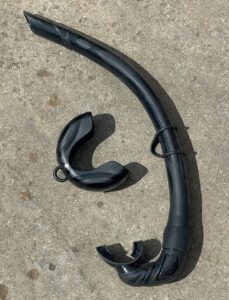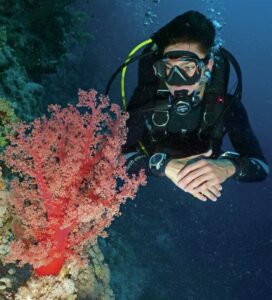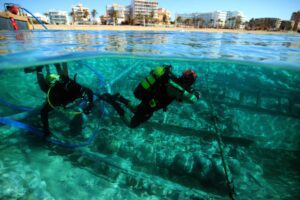Dr Oliver Firth has gained considerable experience in the field of diving and hyperbaric medicine since joining LDC in 2006. He is an Approved Medical Examiner of Divers for the UK HSE, and a medical referee for the UK Sport Diving Medical Committee. He is involved in the management of all types of diving-re- lated illness, including recompression treatment, as well as providing hyperbaric oxygen therapy for non-diving conditions. He remains a passionate diver and has participated in various expeditions and conservation projects throughout the globe.
Q: I’m a novice diver so I hope this question doesn’t sound stupid. I’m
a bit of an exercise freak and train with weights most days for at least two hours. Some of the lads at the gym are divers and were saying that you shouldn’t exercise when you dive as it might trigger the bends. Is this true? I’m booked on a dive trip to Egypt next month and I chose the ho- tel because it’s got a fantastic gym, although it’s expensive. Can I still do my weights, or should I bin it and do a liveaboard instead?
A: With the obesity epidemic booming like Barry White on testosterone, we’re constantly being admonished from all sides for not doing enough exercise. Chomping on bacon butties after a five-minute bimble at Stoney doesn’t help either. On occasion though, diving can be a physically demanding sport – those tanks don’t carry themselves, and unexpected currents can put a sudden strain on the fittest of finners. But there are, as you say, concerns that exercise can increase the chance of DCI. How to balance the two?
Like a good joke, it’s all in the timing. Vigorous exercise agitates and warms the blood, as well as causing shearing of tissues with movement. These factors are thought to produce ‘micronuclei’, which in essence are the beginnings of very tiny bubbles. These micronuclei can turn into bigger bubbles, or act as ‘seeds’ around which bubbles can form. And more bubbles means a higher risk of DCI. Luckily, about 98 percent of micronuclei vanish within six hours, so the advice is to leave a minimum of six hours after exercising before diving.
Another (admittedly preliminary) study has shown that exercise 24 hours prior to diving might actually reduce the chance of DCI – the cause of this phenomenon is being investigated. So a workout 24 hours beforehand might be protective, but you should reduce the duration and intensity of any exercise closer to a dive, and avoid any from six hours before a dive. The other aspect is dehydration – remember your fluids too. During a dive, the idea is to minimise your inert gas absorption – flapping around like an untrained seal will increase your nitrogen uptake and make bends more likely. On the ascent, however, there is now good evidence that light exercise will accelerate off-gassing, and can therefore reduce DCI risk. By light I mean leisurely finning, rather than hanging motionless on the shot line.
What about after a dive? The same suggestions apply: strenuous gym sessions could cause more micronuclei to form, and gas might be liberated from muscles as the blood flow to them increases. Any post-dive workout should be gentle and at least six hours after the dive to allow sufficient time for micronuclei to disappear.
Q: Just wanted some information, could you help please? I am currently half way through a trimix course overseas, and maybe the sun’s got to me, but I’ve decided to get a tattoo on my back. Is it still okay to continue with my course having just had a tattoo, and if not how long would I need to leave it? Thanks so much.
A: Beckham-style wings? “APNEA” in bold Cyrillic up your spine? A pod of dolphins leaping playfully across your trapezii? I’ve seen plenty of tats in the course of doing daily dive medicals, some pretty cool, others just unfathomable. You need to be wary of needle hygiene in foreign parts as injections of blood and dirty ink are notorious for transmitting HIV, hepatitis B and other nefarious nasties.
Freshly tattooed skin is quite raw and will tend to scab over, so ideally you need to wait until it’s fully healed up before getting wet. How long that is depends on your individual metabolism and immune system – it probably takes at least ten-14 days. Desperate divers who just can’t stay dry some- times use thin layers of Vaseline and clingfilm to keep the water off their new design.
Do also read about Headaches and Diving








